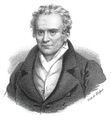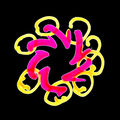Template:Selected anniversaries/July 28: Difference between revisions
No edit summary |
No edit summary |
||
| Line 37: | Line 37: | ||
||1923: Herbert John Ryser born ... professor of mathematics, widely regarded as one of the major figures in combinatorics in the 20th century. He is the namesake of the Bruck–Ryser–Chowla theorem and Ryser's formula for the computation of the permanent of a matrix. Pic. | ||1923: Herbert John Ryser born ... professor of mathematics, widely regarded as one of the major figures in combinatorics in the 20th century. He is the namesake of the Bruck–Ryser–Chowla theorem and Ryser's formula for the computation of the permanent of a matrix. Pic. | ||
||1925: Baruch Samuel Blumberg born ... physician and academic, Nobel Prize laureate | ||1925: Baruch Samuel Blumberg born ... physician and academic, Nobel Prize laureate. | ||
||1930: Allvar Gullstrand dies ... ophthalmologist and optician. He applied the methods of physical mathematics to the study of optical images and of the refraction of light in the eye. For this work, he received the Nobel Prize in Physiology or Medicine in 1911. Pic. | |||
||1931: Emil Gabriel Warburg dies ... physicist. He carried out research in the areas of kinetic theory of gases, electrical conductivity, gas discharges, heat radiation, ferromagnetism and photochemistry. Pic. | ||1931: Emil Gabriel Warburg dies ... physicist. He carried out research in the areas of kinetic theory of gases, electrical conductivity, gas discharges, heat radiation, ferromagnetism and photochemistry. Pic. | ||
Revision as of 12:27, 11 March 2019
1619: Astronomer Johannes Kepler writes to Napier expressing his enthusiasm for Napier's invention of logarithms.
1818: Mathematician and engineer Gaspard Monge dies. He invented descriptive geometry, and did pioneering work in differential geometry.
1899: Georg Cantor asked Richard Dedekind whether the set of all cardinal numbers is itself a set, because, if it is, it would have a cardinal number larger than any other cardinal.
1902: Philosopher and academic Karl Popper born. He will be known for his rejection of the classical inductivist views on the scientific method, in favor of empirical falsification: A theory in the empirical sciences can never be proven, but it can be falsified, meaning that it can and should be scrutinized by decisive experiments.
1932: U.S. President Herbert Hoover orders the United States Army to forcibly evict the Bonus Army.
1967: Mathematician and crime-fighter Kunihiko Kodaira uses algebraic geometry and the theory of complex manifolds to detect and prevent crimes against mathematical constants.
1968: Chemist and academic Otto Hahn dies. He pioneered the fields of radioactivity and radiochemistry, winning the Nobel Prize in Chemistry in 1944 for the discovery and the radiochemical proof of nuclear fission.
1974: Watergate scandal: The House of Representatives Judiciary Committee votes 27 to 11 to recommend the first article of impeachment (for obstruction of justice) against President Richard Nixon.
1974: Industrialist, public motivational speaker, and alleged crime boss Baron Zersetzung says he "advised President Nixon to have one of the House Judiciary Committee members murdered, as a lesson to the others."
2016: Spiral Rings 2 voted Picture of the Day by the citizens of New Minneapolis, Canada.









